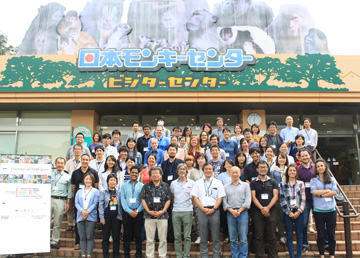
The 8th International Symposium on Primatology and Wildlife Science
Date:
September 26-28, 2017
Award Winners:
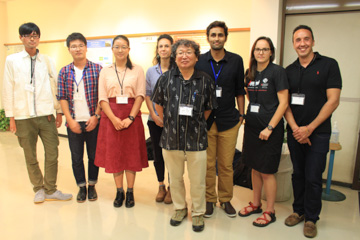
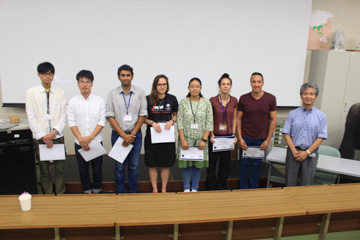
Oral Presentation
1st Prize:
Jie GAO
"The Body Inversion Effect in Chimpanzees (Pan troglodytes) "
"The Body Inversion Effect in Chimpanzees (Pan troglodytes) "
2nd Prize:
Cécile Anna SARABIAN
"CONTAMINATION-RISK SENSITIVITY IN PAPIONINI & HOMININI"
"CONTAMINATION-RISK SENSITIVITY IN PAPIONINI & HOMININI"
3rd Prize:
Josue Alejandro PASTRANA
"Stress in male Japanese macaques living in vegetated and non-vegetated enclosures"
"Stress in male Japanese macaques living in vegetated and non-vegetated enclosures"
Poster Presentation
1st Prize:
Nachiketha Sharma
"Insights on potential 'alarm' calls in Asian elephants"
"Insights on potential 'alarm' calls in Asian elephants"
2nd Prize:
Sota INOUE
"Herd and harem: two social classes in feral horses"
"Herd and harem: two social classes in feral horses"
3rd Prize:
Kei MATSUSHIMA
"The gumnivorous diet induces the structural change of gut microbiota in lesser slow loris"
Maegan Fitzgerald
"Chimpanzee habitat use and conservation in the Nimba Mountains of Guinea, West Africa"
"The gumnivorous diet induces the structural change of gut microbiota in lesser slow loris"
Maegan Fitzgerald
"Chimpanzee habitat use and conservation in the Nimba Mountains of Guinea, West Africa"
Program:
 Program
Program
Last updated on 22 September, 2017
DAY 1: September 26
13:00-14:00
Registration
14:00-14:10
Opening Remarks
Tetsuro Matsuzawa PWS Program Coordinator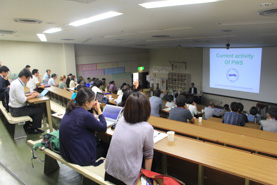
Tetsuro Matsuzawa PWS Program Coordinator

14:10-
15:30
Session 1: Progress Report by PWS Members
Chair: Yuko Hattori
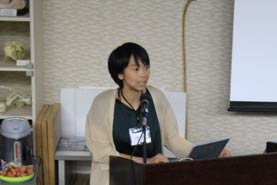
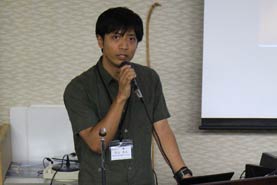
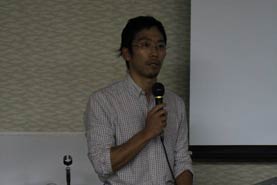
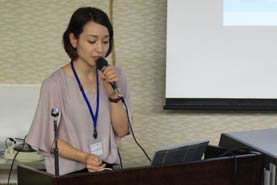
Current activities and future perspectives of activities at the zoos: research, animal welfare and visitor education working harmoniously
Yumi Yamanashi Center for Research and Education of Wildlife, Kyoto City Zoo
Spontaneous smiles in newborn Japanese macaques
Fumito Kawakami Wildlife Research Center, Kyoto University
Observation and experiments with our evolutionary and socially closest animals: chimpanzees, bonobos, horses and dogs
Shinya Yamamoto Graduate School of Intercultural Studies, Kobe University
Socioecology of wild horses inhabiting in the mountain Serra D’Arga, northern Portugal
Monamie Ringhofer Graduate School of Intercultural Studies, Kobe University




Current activities and future perspectives of activities at the zoos: research, animal welfare and visitor education working harmoniously
Yumi Yamanashi Center for Research and Education of Wildlife, Kyoto City Zoo
Spontaneous smiles in newborn Japanese macaques
Fumito Kawakami Wildlife Research Center, Kyoto University
Observation and experiments with our evolutionary and socially closest animals: chimpanzees, bonobos, horses and dogs
Shinya Yamamoto Graduate School of Intercultural Studies, Kobe University
Socioecology of wild horses inhabiting in the mountain Serra D’Arga, northern Portugal
Monamie Ringhofer Graduate School of Intercultural Studies, Kobe University
15:30-16:00
Coffee Break
16:00-18:00
Poster Session
17:00-
PWS Exam
18:00-
Get Together Party
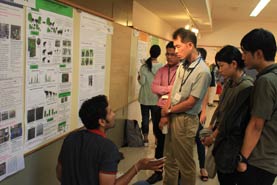
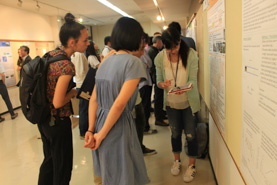
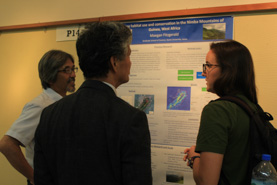
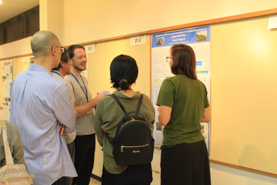
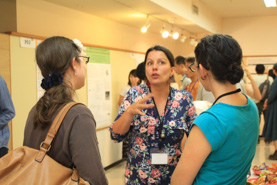
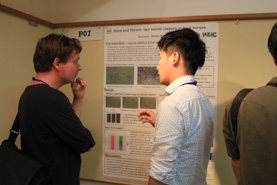
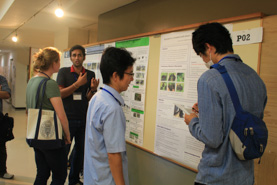
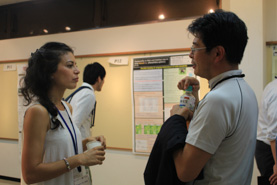
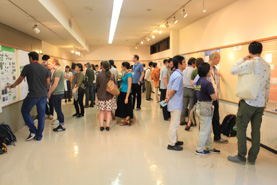
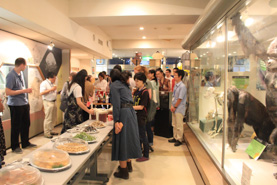
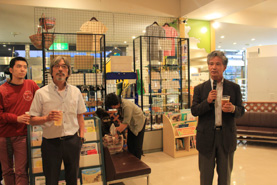
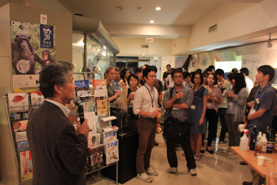
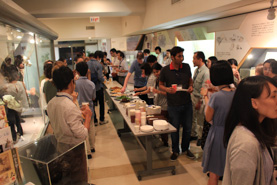
DAY 2: September 27
9:15-10:30
Session 2: Progress Report by PWS Students 1 (L1- L4)
Chair: Takushi KISHIDA
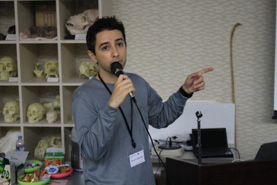
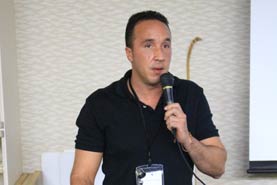
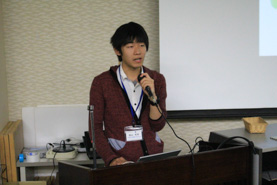
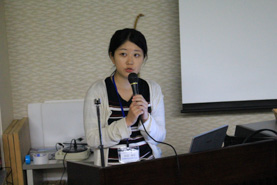
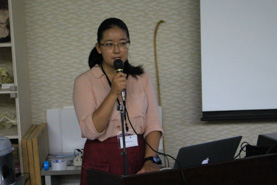
Progress Report: Salivary alpha-amylase enzyme as a non-invasive biomarker of acute stress in Japanese macaques (Macaca fuscata )
Nelson Broche (L1) Primate Research Institute, Kyoto University
Stress in male Japanese macaques living in vegetated and non-vegetated enclosures
Josue Alejandro Pastrana (L3) Primate Research Institute, Kyoto University
Effect of Distractor Timing on Localizing Auditory Source in Chimpanzees (Pan troglodytes ) and Humans (Homo Sapience )
Hiroya Takiyama(L1) Primate Research Institute, Kyoto University
Are chimpanzees attracted by infant?
Yuri Kawaguchi (L2) Primate Research Institute, Kyoto University
The Body Inversion Effect in Chimpanzees (Pan troglodytes )
Gao Jie (L2) Primate Research Institute, Kyoto University





Progress Report: Salivary alpha-amylase enzyme as a non-invasive biomarker of acute stress in Japanese macaques (Macaca fuscata )
Nelson Broche (L1) Primate Research Institute, Kyoto University
Stress in male Japanese macaques living in vegetated and non-vegetated enclosures
Josue Alejandro Pastrana (L3) Primate Research Institute, Kyoto University
Effect of Distractor Timing on Localizing Auditory Source in Chimpanzees (Pan troglodytes ) and Humans (Homo Sapience )
Hiroya Takiyama(L1) Primate Research Institute, Kyoto University
Are chimpanzees attracted by infant?
Yuri Kawaguchi (L2) Primate Research Institute, Kyoto University
The Body Inversion Effect in Chimpanzees (Pan troglodytes )
Gao Jie (L2) Primate Research Institute, Kyoto University
10:30-11:00
Coffee Break
11:00-
12:00
Session 3: Progress Report by PWS Students 2 (L1-L4)
Chair: Ikuma ADACHI
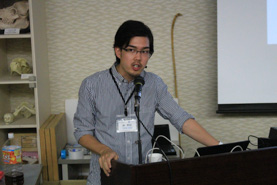
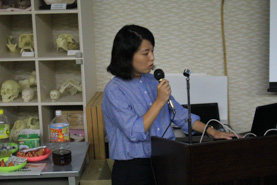
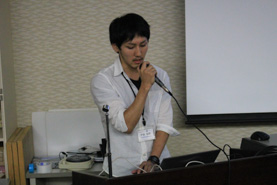
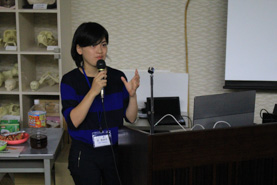
Research Report: Monkeys, Insects and Plants
Akito Toge (L2) Primate Research Institute, Kyoto University
Shark-bite wounds on wild Indo-Pacific bottlenose dolphins (Tursiops aduncus ): a possible marker of their nighttime behavior and/or habitat-use
Miho Tanaka(L2) Wildlife Research Center, Kyoto University
Development of Social Grooming in Female Bonobos Compared with Female Chimpanzees
Kazuya Toda (L4) Primate Research Institute, Kyoto University
Ontogeny of feeding behavior of saki, the Amazonian seed eater (Study plan)
Makiko Take (L3) Primate Research Institute, Kyoto University




Research Report: Monkeys, Insects and Plants
Akito Toge (L2) Primate Research Institute, Kyoto University
Shark-bite wounds on wild Indo-Pacific bottlenose dolphins (Tursiops aduncus ): a possible marker of their nighttime behavior and/or habitat-use
Miho Tanaka(L2) Wildlife Research Center, Kyoto University
Development of Social Grooming in Female Bonobos Compared with Female Chimpanzees
Kazuya Toda (L4) Primate Research Institute, Kyoto University
Ontogeny of feeding behavior of saki, the Amazonian seed eater (Study plan)
Makiko Take (L3) Primate Research Institute, Kyoto University
12:00-13:30
Lunch Break & Group Photo
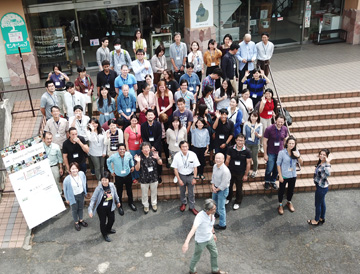
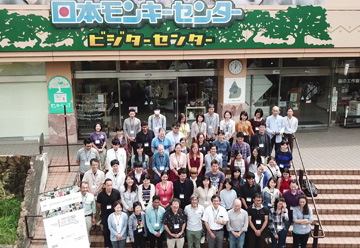
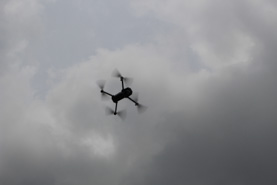



13:30
-
14:30
15:00 - 16:00
15:00 - 16:00
Session 4: Final Report by PWS L5 Students
Chair: Andrew MACINTOSH
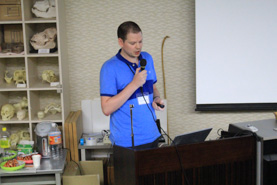
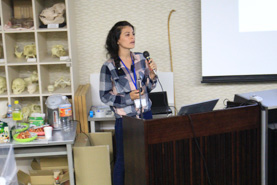
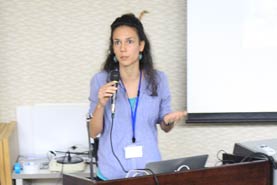
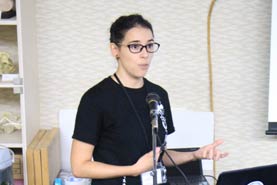
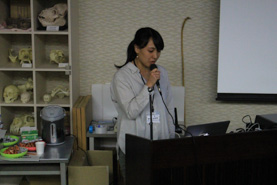
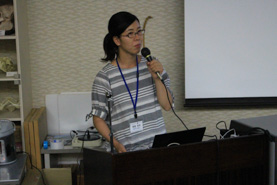
Facial discrimination and attentional bias towards faces in chimpanzees - Final PWS Report
Duncan Wilson (L5) Primate Research Institute, Kyoto University
Allogrooming body site preferences: A two-by-two comparison between the Pan species
Morgane Allanic (L5) Primate Research Institute, Kyoto University
CONTAMINATION-RISK SENSITIVITY IN PAPIONINI & HOMININI
Cecile Sarabian (L5) Primate Research Institute, Kyoto University
Host-Parasite Systems Dynamics in Human-Modified Habitats
Liesbeth FRIAS (L5) Primate Research Institute, Kyoto University
Behavior of wild dolphins to underwater swimmers : Difference in inquiring behavior and swimming position in the group by sex and age class
Kasumi Sakakibara (L5) Wildlife Research Center, Kyoto University
Giraffe habitat selection for resting and nursing in Katavi National Park, Tanzania
Miho Saito (L5) Wildlife Research Center, Kyoto University
(14:30-15:00 Coffee Break)






Facial discrimination and attentional bias towards faces in chimpanzees - Final PWS Report
Duncan Wilson (L5) Primate Research Institute, Kyoto University
Allogrooming body site preferences: A two-by-two comparison between the Pan species
Morgane Allanic (L5) Primate Research Institute, Kyoto University
CONTAMINATION-RISK SENSITIVITY IN PAPIONINI & HOMININI
Cecile Sarabian (L5) Primate Research Institute, Kyoto University
Host-Parasite Systems Dynamics in Human-Modified Habitats
Liesbeth FRIAS (L5) Primate Research Institute, Kyoto University
Behavior of wild dolphins to underwater swimmers : Difference in inquiring behavior and swimming position in the group by sex and age class
Kasumi Sakakibara (L5) Wildlife Research Center, Kyoto University
Giraffe habitat selection for resting and nursing in Katavi National Park, Tanzania
Miho Saito (L5) Wildlife Research Center, Kyoto University
(14:30-15:00 Coffee Break)
16:00-18:00
Poster Session
18:00-
Get Together Party
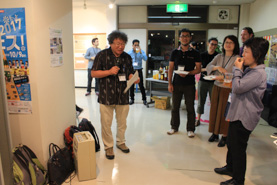
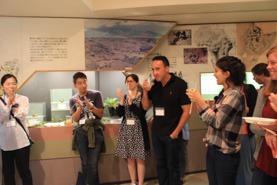
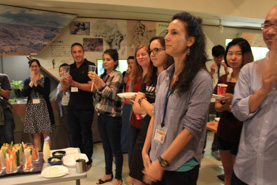
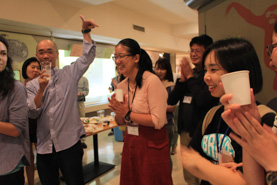




Day 3 September 28
9:00-9:30
Session 5: Award Talk by Poster Presentation Award Winners
Chair: Takashi HAYAKAWA
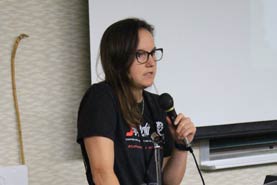
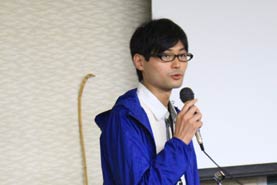
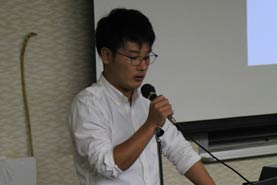
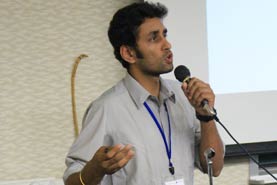
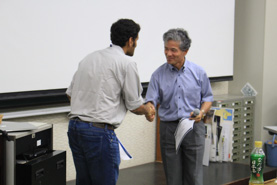
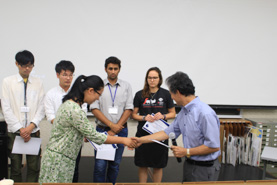






9:30
-
10:50
Session 6: Research Activities in Japan Monkey Centre
Chair: Misato HAYASHI
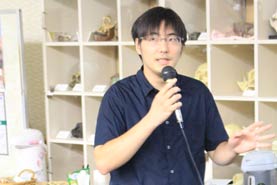
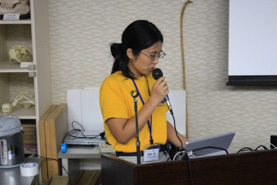
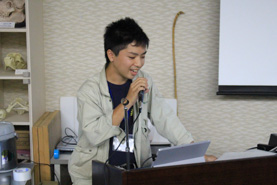

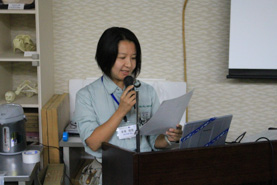
Microbiome adaptation and flexibility to the captive environments in lessor slow loris
Takashi Hayakawa Primate Research Institute, Kyoto University
Benefit of diversity in captive chimpanzees’ social group formation
Yui Fujimori Japan Monkey Centre
Establishing Slow-Loris conservation center and improving living environment of Lesser Slow Loris.
Kei Nemoto Japan Monkey Centre
Nocturnal behavior of captive lemurs
Chigusa Tanaka Japan Monkey Centre
Educational effect of focal animal observation program for students
Rie Akami Japan Monkey Centre





Microbiome adaptation and flexibility to the captive environments in lessor slow loris
Takashi Hayakawa Primate Research Institute, Kyoto University
Benefit of diversity in captive chimpanzees’ social group formation
Yui Fujimori Japan Monkey Centre
Establishing Slow-Loris conservation center and improving living environment of Lesser Slow Loris.
Kei Nemoto Japan Monkey Centre
Nocturnal behavior of captive lemurs
Chigusa Tanaka Japan Monkey Centre
Educational effect of focal animal observation program for students
Rie Akami Japan Monkey Centre
10:50-11:00
Closing Remarks
Tetsuro Matsuzawa PWS Program Coordinator
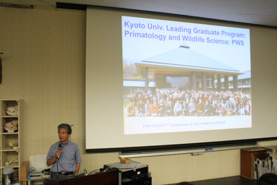
Tetsuro Matsuzawa PWS Program Coordinator

11:00-
Excursion at Japan Monkey CentreTakashi Hayakawa
・Kayak Paddling / Drone
・Backyard
・Loris
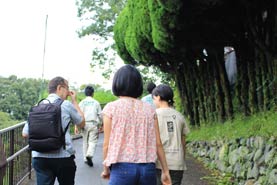
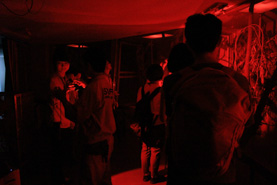
・Kayak Paddling / Drone
・Backyard
・Loris


Venue:
Japan Monkey Centre
Map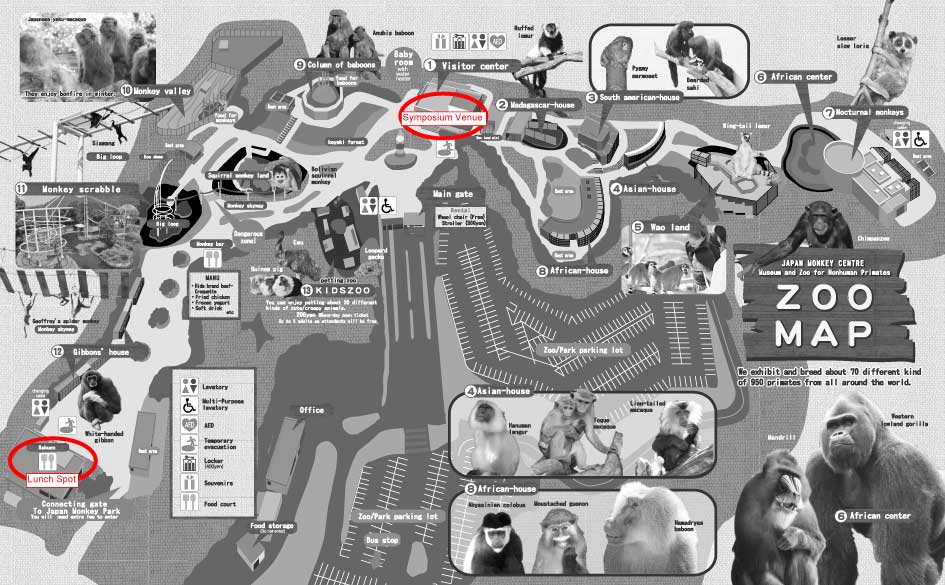
Walking Guide from the Inuyama Station to the Japan Monkey Centre
Click HERE and open this map in a new tab (https://goo.gl/maps/FxNxXymDQLs)
Map

Walking Guide from the Inuyama Station to the Japan Monkey Centre
Click HERE and open this map in a new tab (https://goo.gl/maps/FxNxXymDQLs)
Registration:
The deadline for online registration and abstract submission has passed.
Please click [here] to access the online registration form. Changes to your entered information can be made at any time up until the deadline. To help the PWS office to estimate the number of participants, please register as soon as possible. We appreciate your cooperation. Presentation titles and abstracts can be added after initial registration has been completed.
Accommodation:
For accommodation, please arrange on your own.
参加人数:
26日:84人(うち外国人20人)、27日:76人(うち外国人22人)、28日:61人(うち外国人17人)、参加人数合計221人(うち外国人59人)